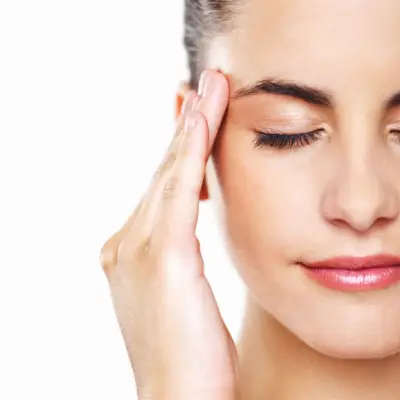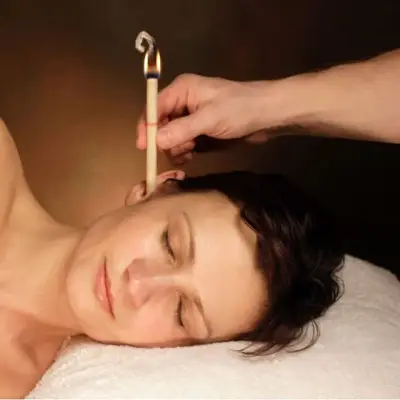A good night's sleep is essential for all aspects of health. When you feel rested, everything else falls into place, and you are better prepared to handle the challenges of everyday life.
Unfortunately, sleep disorders are on the rise, and more people than ever are struggling to sleep peacefully. This article will explore 20 tips for better sleep, all from a holistic perspective.
Jump to:
- Understanding the Mind-Body Connection in Sleep
- Creating a Sleep-Inducting Bedroom Environment
- Using Reiki as Part of Your Relaxing Bedtime Routine
- Breathing Techniques for a Peaceful Night's Rest
- Nutrition and Sleep: The Foods That Aid Restfulness
- Yoga and Sleep: Poses to Help You Wind Down
- The Importance of Reducing Screen Time Before Bed
- Harnessing the Power of Aromatherapy for Sleep
- Mindfulness Meditation to Ease into Sleep
- Understanding the Role of Hormones for Better Sleep
- Sleep Journaling: Reflecting on Thoughts and Emotions
- Acupressure and Rest: Helpful Healing Points
- Integrating Yoga Nidra to Boost Energy Levels
- Relaxation Therapy and the Importance of Stress Management
- Understanding Your Body's Natural Sleep Patterns
- Embracing the Power of Positive Sleep Affirmations
- Using Massage to Relax and Unwind
- Integrating Exercise into Your Daily Routine for Better Sleep
- How to Cultivate a Mindset for Restful Sleep
- Embracing Non-Attachment and Removing the Pressure of a Perfect Night's Sleep
- Study Insomnia Practitioner Course for £29
Recommended for you!
Best Sellers1. Understanding the Mind-Body Connection in Sleep
First, it is essential to understand the mind-body connection when sleeping peacefully. Our thoughts, feelings, and attitudes can all impact our physical health.
Feeling stressed and overwhelmed? Your body will likely reflect this. Equally, if you're feeling calm and relaxed, your body will likely be in a state of ease.
Becoming aware of the mind-body connection to sleep means becoming aware of your state of mind and how this might affect your ability to switch off at night.
To implement this tip, try asking yourself the following questions to begin cultivating a better awareness of this connection:
- On a scale of 1-10 (1 being the minimum and 10 being the maximum), what are your everyday stress levels?
- How happy and fulfilled are you daily?
- What challenges are you currently navigating, and how do these impact your mindset?
The more you become aware of the mind-body connection, the better you'll understand your current sleep patterns and what keeps you from sleeping peacefully.
2. Creating a Sleep-Inducing Bedroom Environment
Your sleep quality will likely suffer if your bedroom doesn't promote relaxation and tranquillity.
Let's start with electronic devices first. Even though it's tempting to have TVs, phones, and other devices in the bedroom, these devices all have the potential to provide too much stimulation, negatively affecting the chances of peaceful sleep. Try keeping your bedroom a technology-free zone.
Lighting is also essential. Opt for soft, warm, and dimmable lighting that mimics the natural transition from day to night. Eliminate any sources of harsh, blue light from electronic devices that can disrupt your circadian rhythm. Black-out curtains or blinds can also help regulate your sleep-wake cycle.
Maintaining a comfortable temperature is key; a slightly cooler room is generally conducive to sleep. Try using soft, breathable bedspreads that help your body temperature naturally regulate itself.
Declutter your space to create a clean and serene atmosphere, and choose calming colours that promote relaxation.
Think natural, calming, and free of distractions when it comes to a sleep-inducing environment. You'll be amazed at how these simple changes can improve your sleep.
3. Using Reiki as Part of Your Relaxing Bedtime Routine
One practice that fits seamlessly into a relaxing bedtime routine is Reiki, a Japanese technique for promoting self-healing and stress reduction.
Reiki is unique in that it can be self-administered. By channelling calming and balancing energy through placing your hands over specific areas of the body, Reiki can bring a sense of relaxation to the body, mind, and spirit.
Incorporating Reiki into your nightly routine can help release built-up tension and ease any mental or emotional turmoil that might prevent you from sleeping peacefully.
Try this technique by getting comfortable in your bedroom, dimming the lights and playing soft, soothing music. As your hands hover over various energy centres, let go of the day's worries and negative thoughts, inviting in a sense of calm and serenity.
If you feel drawn to this healing technique, our Reiki 1 and 2 Diploma Course is a fantastic way to become an expert in this powerful form of holistic therapy.
4. Breathing Techniques for a Peaceful Night's Rest
Breathing is a simple yet powerful tool that can directly impact our levels of well-being and harmony. Although there are many amazing breathing techniques, deep diaphragmatic breathing is one of the most effective for better sleep.
Begin by finding a comfortable position in your bedroom, whether lying down or sitting up. Close your eyes and place one hand on your chest and the other on your abdomen. Inhale slowly and deeply through your nose, allowing your abdomen to rise as you fill your lungs with air. Feel your chest rise as you reach full inhalation. Exhale slowly and completely through your mouth, feeling your abdomen fall and your chest lower. Focus your attention solely on the rhythm of your breath, letting go of intrusive thoughts.
Breathing deeply into the belly might feel strange at first, but trust this technique.
Diaphragmatic breathing is excellent in triggering a relaxation response within the body when practised regularly.
5. Nutrition and Sleep: The Foods That Aid Restfulness
The connection between nutrition and sleep is fascinating and is beginning to be taken seriously by the wellness community. Just as certain foods can energise us during the day, others can contribute to a peaceful sleep.
Magnesium-rich foods such as leafy greens, bananas, and cashews can relax muscles and calm the nervous system, aiding in a more peaceful slumber.
On the flip side, limiting the intake of caffeine, spicy foods, and heavy meals close to bedtime is advisable, as they can disrupt digestion and make falling asleep more challenging.
Being mindful of the foods you consume in the hours leading up to bedtime can pave the way for a night of deep, rejuvenating sleep.
If you're interested in nutrition, our Mindful Nutrition Diploma Course is an excellent way to become an expert in creating an optimal diet for yourself and others.
6. Yoga and Sleep: Poses to Help You Wind Down
Yoga is a wonderful way of easing physical, emotional, and mental tension, essential for peaceful sleep. Spending ten to fifteen minutes stretching before bed is a natural way of helping you drift off into a deep sleep, ensuring you wake up refreshed. Here are our favourite poses.
Child's pose (Balasana): start kneeling on the floor with your big toes touching and your knees spread apart. Sit back on your heels and exhale as you lower your torso between your thighs. Allow your forehead to rest on the floor or a cushion. Extend your arms in front of you or alongside your body, palms facing up. Breathe deeply and sink into the pose, feeling a gentle stretch in your hips, lower back, and shoulders.
Forward fold (Uttanasana): begin by standing upright with your feet hip-width apart. As you exhale, gently hinge at your hips and fold forward, allowing your head and upper body to descend towards your legs. Bend your knees slightly if necessary to avoid strain. You can let your hands rest on the floor beside your feet, on your shins, or grasp your elbows and sway gently from side to side for a deeper stretch.
Legs up the wall (Viparita Karani): Find an open wall space. Sit sideways on the floor with one hip touching the wall and your legs extending parallel. As you recline onto your back, swing your legs up along the wall. Your sitting bones should be as close to the wall as comfortable, and your arms can rest by your sides or on your abdomen.
It's important to practise yoga regularly to feel the benefits fully. These gentle, relaxing, and grounding yoga poses will help you experience a peaceful night's sleep.
7. The Importance of Reducing Screen Time Before Bed
If you implement one tip for better sleep, this might be the most effective.
The blue light emitted by screens suppresses the production of melatonin, the hormone responsible for regulating our sleep-wake cycle. This disruption in melatonin can lead to difficulties falling asleep, reduced sleep duration, and even lower sleep quality.
Consuming digital content also stimulates our minds and can heighten stress levels, making it harder to unwind and relax before bedtime. Instead of scrolling through social media or binge-watching shows, consider limiting screen time in the evenings.
Calming activities such as reading or meditating can signal your body that it's time to wind down. By prioritising screen-free evenings, you can pave the way for a more peaceful night's sleep, allowing you to wake up feeling refreshed and ready to take on the day.
8. Harnessing the Power of Aromatherapy for Sleep
Aromatherapy can be a game-changer in your quest for a restful night's sleep. Scents profoundly impact our emotions and physiological responses, making them a potent tool for enhancing sleep quality. Here are the two most effective essential oils for your nighttime routine:
Lavender is renowned for its calming properties and has been used for centuries to encourage relaxation. Consider using lavender essential oil in a diffuser or adding a few drops to your pillowcase to help you relax and unwind before sleeping.
Chamomile is known for its tranquillising effects and is another excellent option that can be used in aromatherapy. Its gentle and floral aroma can help ease tension and anxiety, setting the stage for a peaceful sleep.
When incorporating aromatherapy into your bedtime routine, opting for high-quality, pure essential oils and diluting them properly is important.
Whether you choose to diffuse the scents or mix them with a carrier oil for a soothing massage, the power of aromatherapy can transform your sleep environment into a haven of relaxation, making falling asleep a more effortless and rejuvenating experience.
9. Mindfulness Meditation to Ease into Sleep
Mindfulness meditation has exploded in popularity in recent years, offering an excellent solution to stress management, but did you know it's also an effective tool for peaceful sleep?
Try this simple mindfulness meditation to help you unwind before bedtime. Take a few moments to get as comfy as possible in your bedroom, ideally lying down.
Close your eyes and focus on your breath, allowing it to flow naturally. With each inhale and exhale, bring your awareness to the present moment, letting go of the day's stresses. Notice the sensation of your breath, the rise and fall of your chest, and the gentle rhythm that unfolds.
If thoughts arise, acknowledge them without judgment and gently redirect your attention back to your breath. Equally, if you notice tension in your body, simply witness it without judgment.
Mindfulness meditation teaches you that it is possible to witness thoughts, feelings, and physical sensations without getting swept away by them. Do this before bed to help you drift into a peaceful and deep sleep.
10. Understanding the Role of Hormones for Better Sleep
Although hormones affect every function within the body, it's particularly important to understand their importance when it comes to sleep. They are crucial in regulating our body's internal clock, known as the circadian rhythm.
Melatonin, often called the "sleep hormone," is produced by the pineal gland in response to darkness, signalling to our body that it's time to wind down and prepare for rest.
Cortisol, on the other hand, is often dubbed the "stress hormone" and peaks in the morning to foster alertness and gradually declines throughout the day.
However, irregular sleep patterns, excessive screen time before bed, and high-stress levels can disrupt this delicate hormonal balance, leading to sleep disturbances. Female hormones such as estrogen and progesterone can also impact sleep quality.
If you'd like to learn more about the impact of hormones on sleep quality, our accredited Understanding Hormones Diploma Course is an excellent resource for becoming an expert on the endocrine system.
11. Sleep Journaling: Reflecting on Thoughts and Emotions
In the pursuit of a better night's sleep, journaling is a powerful tool that encourages introspection and promotes a greater self-awareness around our thoughts and emotions.
Try these sleep journaling prompts before you go to sleep. You can always keep a journal and pen on your bedside table and make this part of your evening routine.
- What went well today, and how did this make you feel?
- What challenges did you face today, and how did you overcome them?
- Make a list of 3-5 things you are grateful for.
- How can you offer yourself more kindness and acceptance tomorrow?
Delving into your emotional landscape through journaling can unveil patterns, triggers, and stress sources that could impact your sleep quality.
Whether you engage in freeform writing or structured prompts, journalling can create a sense of closure for the day and pave the way for a more serene and restful night's sleep.
Our accredited Journal Therapy Course provides you with a deep understanding of the therapeutic power of journaling and the psychological and emotional benefits of journaling regularly.
12. Acupressure and Rest: Helpful Healing Points
Acupressure is a non-evasive, natural, and easy technique promoting peaceful sleep. Acupressure taps into the body's natural energy pathways by targeting specific points on the body, facilitating balance and rejuvenation.
Use your fingers to apply pressure to certain body areas to practise acupressure. Here are some effective pressure points to help you sleep better:
Shen Men: this point is located at the top of the ear, just above the helix. Gently applying pressure to this point can alleviate stress and anxiety, allowing for a peaceful transition into slumber.
Anmian: this point is located behind the ear and is renowned for calming the mind and soothing insomnia. It's also effective in soothing restlessness and irritability, making it an ideal acupressure point for relaxation.
Whether you opt for self-massage or enlist the help of a skilled practitioner, acupressure presents a natural and accessible way to harness your body's innate healing abilities and achieve a restful night's sleep.
13. Integrating Yoga Nidra to Boost Energy Levels
You may be familiar with the various forms of yoga, but have you considered adding Yoga Nidra to your relaxation routine?
Yoga Nidra is known as "yogic sleep" and is a form of yoga that requires no moment. Think of it as a guided meditation that takes you on a journey through different layers of consciousness, allowing your body to rest while your mind remains awake deeply.
This form of yoga works on the parasympathetic nervous system, triggering a cascade of healing responses, and promoting physical, mental, and emotional restoration. It is an excellent technique that contributes to a harmonious sleep-wake cycle.
Embracing Yoga Nidra in your daily routine can transform your approach to recharging, unveiling a reservoir of energy that propels you through the day with vitality and renewed enthusiasm.
Our accredited Yoga Nidra Diploma Course will help you become an expert in this deeply restorative practice, allowing you to utilise this technique with yourself or others.
14. Relaxation Therapy and the Importance of Stress Management
In the hustle and bustle of our modern lives, relaxation therapy and effective stress management is essential to promote well-being.
A healthy stress level can be positive as it encourages us to act. However, chronic stress affects our physical and mental well-being, affecting sleep and overall quality of life.
This is where relaxation therapy steps in as a powerful antidote. From progressive muscle relaxation to guided imagery and deep breathing exercises, relaxation techniques offer a sanctuary of calm amidst our busy schedules.
Regular relaxation sessions not only soothe the nervous system but also bolsters our ability to navigate challenges with a clear and focused mind.
Ultimately, prioritising stress management through relaxation therapy empowers us to embrace life's demands with resilience while nurturing our well-being.
If you'd like to become an expert in relaxation techniques, our accredited Relaxation Therapy Diploma Course is an excellent resource for those looking to take their well-being journey to the next level.
15. Understanding Your Body's Natural Sleep Patterns
Our bodies are finely tuned to follow a circadian rhythm—a 24-hour internal clock that regulates sleep-wake cycles. This rhythm is influenced by the rise and fall of the sun and the release of hormones like melatonin.
Paying attention to your body's cues can help you optimise your sleep schedule. Listen to when you naturally feel sleepy and awake, and try to align your bedtime and wake-up time accordingly.
Consistency is crucial; a regular sleep routine helps regulate your body's internal clock, making it easier to fall asleep and wake up naturally.
Whether you're an early bird or a night owl, you must pay attention to your body's sleep/wake cycles to create the best sleep pattern possible.
16. Embracing the Power of Positive Sleep Affirmations
Positive affirmations are a quick, easy, and highly effective way to change your mindset regarding sleep and relaxation.
Affirmations are positive statements you repeat to yourself, either aloud or in your mind, to encourage a shift in mindset and behaviour. When applied to sleep, they can help calm a restless mind and create a peaceful environment for rest.
Here are some sleep affirmations to try repeating before you fall asleep:
- I release the worries of the day.
- I am ready to fully relax and unwind.
- I am deserving of a good night's sleep.
- I invite a sense of peace into my mind and body.
- I let go of pressure and expectations.
Repeating these affirmations during your bedtime routine or as you settle into bed can help quiet the day's chatter and replace it with thoughts that support relaxation and peaceful sleep.
It is important to work with affirmations that make you feel good. You can always create your own for an even greater impact.
17. Using Massage to Relax and Unwind
Physical therapy in the form of massage is an excellent way to relieve the body and mind of unwanted stress that might negatively affect sleep quality.
Physical tension is often a sign of stress or unprocessed emotions. Massage combats this by promoting the release of feel-good hormones like serotonin and reducing stress hormones like cortisol.
This leaves you feeling relaxed and readies your body for a peaceful night's sleep.
Massage can alleviate discomfort and provide a foundation for restorative sleep by addressing tension imbalances within the body.
Whether you opt for a professional session or practice self-care techniques at home, embracing massage therapy as part of your wellness routine can be a game-changer.
18. Integrating Exercise into Your Daily Routine for Better Sleep
Regular exercise is widely accepted to benefit all aspects of health, and sleep is no different.
Regular physical activity has been linked to improved sleep quality and duration, thanks to its ability to regulate hormones, reduce stress, and enhance overall well-being.
Engaging in activities like brisk walking, swimming, or yoga helps burn off excess energy and triggers the release of endorphins, the body's natural mood enhancers.
These endorphins can alleviate stress and anxiety, allowing for a more peaceful and restful sleep. Timing matters, too; aim for morning or early afternoon workouts to give your body enough time to wind down.
As you incorporate exercise into your routine, remember that consistency is key. Even moderate, regular physical activity can substantially impact sleep quality, leaving you with improved fitness and the gift of rejuvenating slumber.
19. How to Cultivate a Mindset for Restful Sleep
Your mindset surrounding relaxation is an essential part of getting a peaceful night's sleep.
Our thoughts and emotions profoundly impact our physical and mental state, directly influencing our sleep quality.
Negative thoughts, stress, and anxiety can activate the body's "fight or flight" response, releasing stress hormones that make it difficult to unwind and sleep peacefully.
On the other hand, a positive and balanced mindset fosters relaxation, reducing the production of stress hormones and promoting the release of feel-good neurotransmitters.
Embracing gratitude, practising mindfulness, and nurturing self-compassion are powerful tools in shaping a positive mindset that primes the body for rest.
When you approach sleep with a sense of calm and acceptance, you are far more likely to sleep deeper and longer.
20. Embracing Non-Attachment and Removing the Pressure of a Perfect Night's Sleep
In our pursuit of a perfect night's sleep, we often create pressure and anxiety around the very thing we seek without realising. Embracing the philosophy of non-attachment can be a liberating approach to achieving restful sleep.
Non-attachment involves letting go of rigid expectations and accepting the present moment. When applied to sleep, this means releasing the pressure to have a flawless sleep experience every night.
Some nights you will sleep well, and other nights you won't. Occasional light or disrupted sleep is a normal part of life. By relinquishing the attachment to perfection, you free yourself from the cycle of stress that can reinforce sleeplessness.
Instead of fixating on the number of hours you slept, focus on the quality of rest you did receive and how you can best support your well-being the following day.
Recommended for you!
Best SellersStudy our Insomnia Practitioner Course for £29
If you want to learn more about helping yourself or others enjoy good quality sleep, you can sign up for our Insomnia Practitioner Course for just £29 using the link below.













